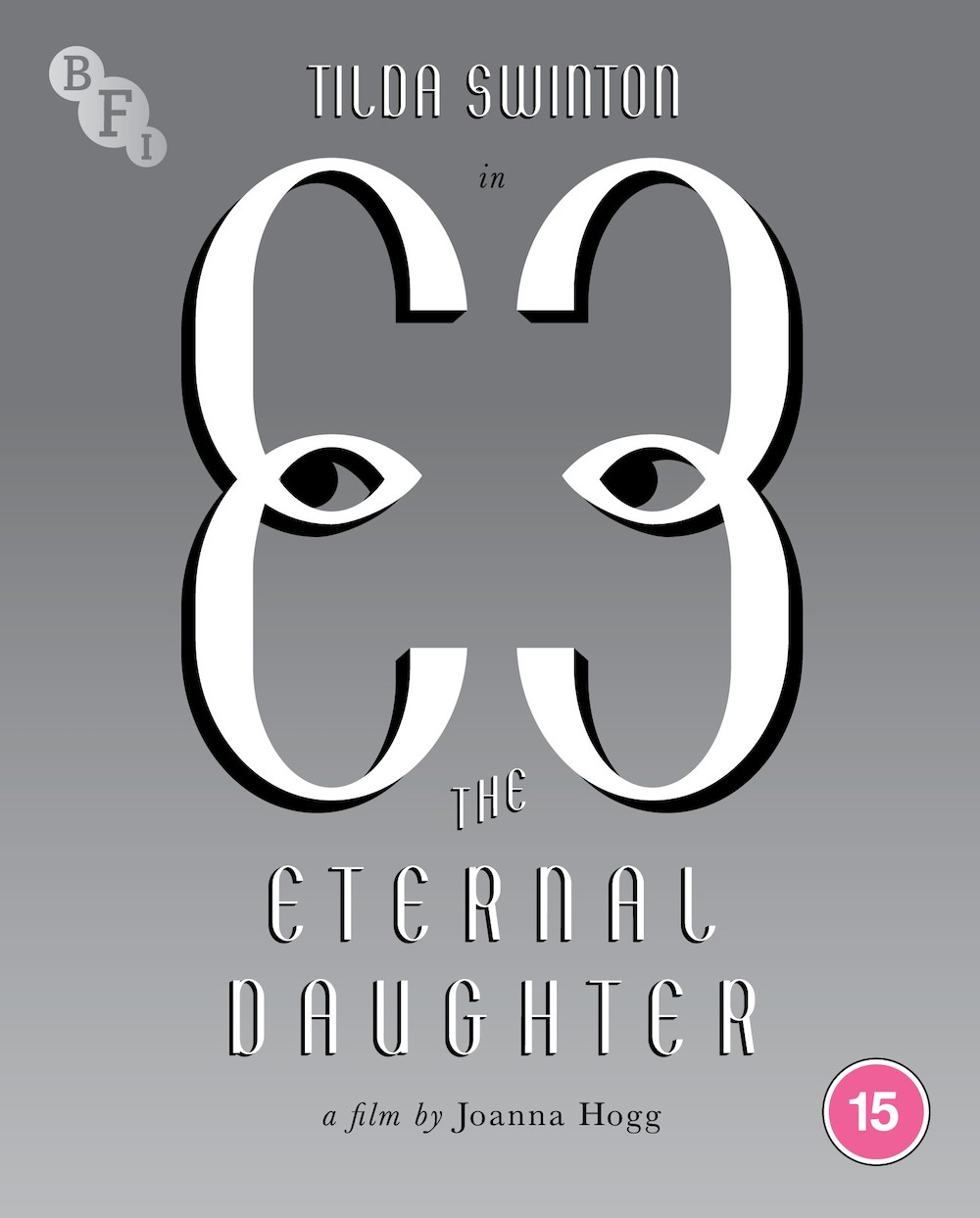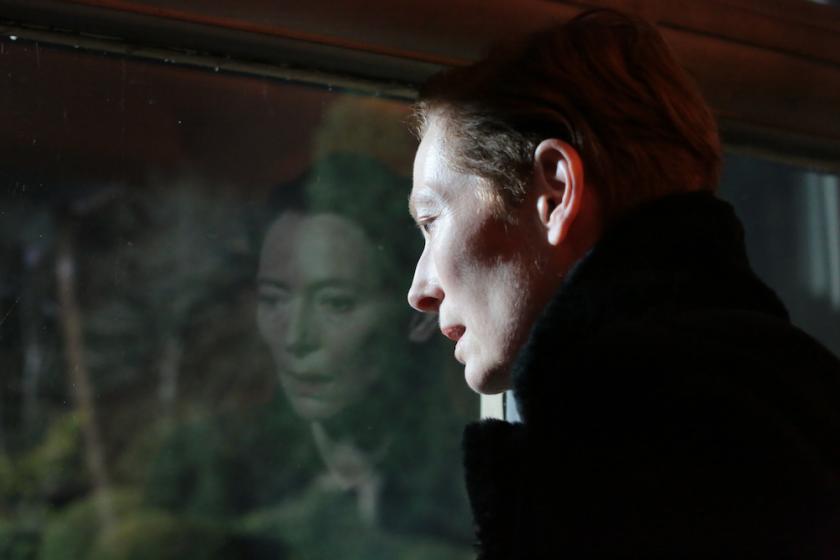In Présages, Joanna Hogg talks about ghosts. This short film from 2023, commissioned by the Pompidou Centre, is included as one of the special features in the new BFI Blu-ray release of Hogg's intensely atmospheric The Eternal Daughter, with its virtuoso performance from Tilda Swinton in a dual role. Other special features include a Q&A with Hogg, Swinton and Francine Stock.
In LA, Hogg says, where she’s shooting Présages in preparation for a film she’s planning there, the constant regeneration of the city “creates the layers of ghosts, the reverberations of the past.” And she recounts an unsettling event: one night the door of her hotel room flew open, then so did the door of the bathroom. Something, she thinks, came in. She calls for the night porter to look, but of course he finds nothing.
It could be a scene from the ghostly, gothic The Eternal Daughter, though there’s no night porter to call in that haunted hotel in Wales with its endless corridors and flights of stairs, where Julie and her mother Rosalind, both played by Swinton, are staying. We see Julie sitting rigidly in bed, her head thrown back, staring at the ceiling – an unsettling pose – listening to strange bangs and creaks, with strains of Bartók in the background.
No one’s at reception, now that the remarkably unfriendly receptionist/waitress (a brilliant Carly-Sophia Davies – the words “battered cod” have never sounded more ominous) has been picked up by the car, with its thumping techno bass, which collects her each evening. Julie watches from a window, Louis the springer spaniel at her side, as the car speeds up the long driveway through the swirling mist. Later a kindly caretaker, Bill (Joseph Mydell), comforts Julie and helps when Louis dashes off into the night.
No one can forget Louis, who is, says Hogg, a master of improvisation. Unsurprisingly, he’s Swinton’s dog, apparently part of a large family who’ve had roles in the Souvenir films. But Swinton knew Louis, who “loved every minute of it”, was destined for greatness in his own solo role.
 And in Présages Hogg talks about her mother, about the dreams she’s been having about her, how much she’s missing her. “I never have the time to take in that she’s not around any more.” Her mother died before The Eternal Daughter was finished. For years Hogg felt she couldn’t make a film about her, that it would be trespassing, that she didn’t have the right.
And in Présages Hogg talks about her mother, about the dreams she’s been having about her, how much she’s missing her. “I never have the time to take in that she’s not around any more.” Her mother died before The Eternal Daughter was finished. For years Hogg felt she couldn’t make a film about her, that it would be trespassing, that she didn’t have the right.
But making the autobiographical The Souvenir and The Souvenir Part II changed that trepidation to some extent, with Tilda Swinton playing Rosalind, Julie’s mother (and – what a complex web – with Honor Swinton Byrne, Tilda’s daughter and Hogg’s goddaughter, as Julie). “The fictionalising helped, the guilt faded away a bit,” says Hogg in a Q&A. And allowing the mother figure to be an ageing Rosalind in her new film continued the process of letting go of what her own mother might think.
In The Eternal Daughter, her deep, long-lasting friendship with Swinton – they were at school together – meant that they could work together with great freedom, developing a kind of improvised, musical conversation about their own mothers without the need for a script writer. Swinton says that Rosalind’s way of speaking, her vernacular, channels her own mother precisely.
It’s an extraordinary double act. Hogg didn’t want trickery – Rosalind and Julie, now middle-aged, don’t appear at the same time, but Hogg cuts back and forth between their conversations. Nothing much, in that exquisitely polite, repressed English way, is said, but it’s rendered so beautifully – “So cosy here, aren’t we.” “Very, very good marmalade.” “Darling, thank you so much, you’re an angel”. Which makes Julie’s outburst at the disturbing birthday dinner, when she despairs of being able to make her mother happy and tells her she’s a “mystery person” to her, even more shocking. And she’s strangely distraught when her mother tells her that the house, which she knew as a child, staying with her aunt Jocelyn during the war, has unhappy memories for her as well as happy ones. We realise that there’s something off about their relationship – and perhaps it’s easy to guess at the twist, revealed at that final dinner.
And she’s strangely distraught when her mother tells her that the house, which she knew as a child, staying with her aunt Jocelyn during the war, has unhappy memories for her as well as happy ones. We realise that there’s something off about their relationship – and perhaps it’s easy to guess at the twist, revealed at that final dinner.
Hogg shoots in chronological order, which is unusual; most directors shoot according to the stars’ schedules. It’s well known that she writes a preliminary document, more like a short story than a script (we see Julie, at the end of The Eternal Daughter, finally managing to get down to writing her own film, which is, in this meta world, the film we’re still watching – “a white taxi…fog hangs low.”) We had a basic outline of the trajectory of the three dinners, says Swinton, but not much else. "It’s an incredibly free way of working.” Executive producer Martin Scorsese, says Hogg, gave detailed feedback and helped her change the originally melodramatic end to the birthday dinner – in which, aficionados may notice, Swinton wears dresses that Julie and Rosalind wore in the Souvenir films.
At the end of the film, a bustling new energy prevails. Julie’s script is underway, the receptionist is friendly, there are other guests in the hitherto empty hotel. But have the ghosts been dispelled? Probably not.















Add comment